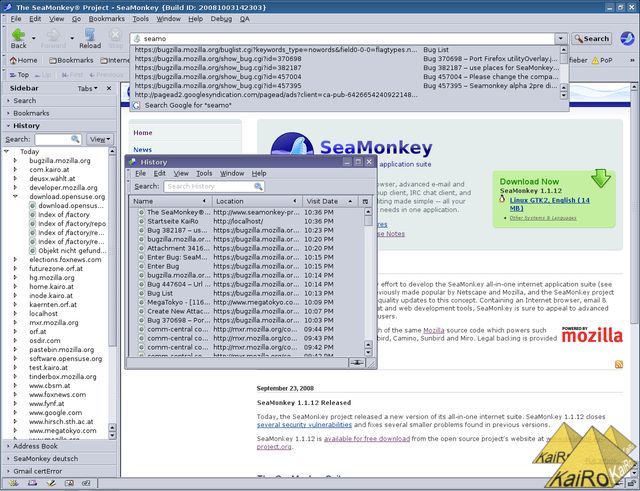08.10.2008 17:42
<< Weekly Status Report, W39/2008 | The roads I take... | 47 >>
What Places Has SeaMonkey Been At?
I've been using places history in SeaMonkey for a long time now, getting the awe... er, helpful search algorithm that this new implementation brings right in SeaMonkey's urlbar.
As nobody picked up UI work for sidebar and history window though, we still can't make this system available for new users and need to stick with the old, outdated, unmaintained, mork xpfe history backend.
Yesterday, I decided I can't stand that any more and started copying code from mozilla/browser/ to suite/ - first the history sidebar panel, then all stuff it pulls in, then I injected parts of places organizer into the SeaMonkey history window, until today I arrived at this:

Note the search results of the urlbar matching URLs in the middle and page titles, sorted so that stuff I've been visiting more often is at the top. Both the grouped sidebar view and the table-style history window have a simple search bar now, and due to retrieving only needed stuff from SQLite instead of loading everything into memory, we can vastly increase the amount of URLs we can store in the history.
This is not ready to land, I still need to do a lot of cleanup in the code, as we don't need to pull in all kinds of bookmark stuff, and we need a few functions added to utilityOverlay before this can be checked in - but I came to actually working code much faster than I had expected. And I hope all SeaMonkey testers will be able to store all the places they've been to in the shiny new format by Alpha 2!
(P.S.: Expect the official Alpha 1 release this weekend!)
As nobody picked up UI work for sidebar and history window though, we still can't make this system available for new users and need to stick with the old, outdated, unmaintained, mork xpfe history backend.
Yesterday, I decided I can't stand that any more and started copying code from mozilla/browser/ to suite/ - first the history sidebar panel, then all stuff it pulls in, then I injected parts of places organizer into the SeaMonkey history window, until today I arrived at this:
Note the search results of the urlbar matching URLs in the middle and page titles, sorted so that stuff I've been visiting more often is at the top. Both the grouped sidebar view and the table-style history window have a simple search bar now, and due to retrieving only needed stuff from SQLite instead of loading everything into memory, we can vastly increase the amount of URLs we can store in the history.
This is not ready to land, I still need to do a lot of cleanup in the code, as we don't need to pull in all kinds of bookmark stuff, and we need a few functions added to utilityOverlay before this can be checked in - but I came to actually working code much faster than I had expected. And I hope all SeaMonkey testers will be able to store all the places they've been to in the shiny new format by Alpha 2!
(P.S.: Expect the official Alpha 1 release this weekend!)
Beitrag geschrieben von KaiRo und gepostet am 3. Oktober 2008 22:58 | Tags: Mozilla, places, SeaMonkey, SeaMonkey 2 | 3 Kommentare
TrackBack/Pingback
Kommentare
| Autor | Beitrag |
|---|---|
aus United States | |
Webmaster | |
Drew aus Maryland | I've been waiting for mork to die for a long time, being a SeaMonkey user with a slow PC (vintage Athlon XP) and an unyielding desire to keep 6 months' worth of web history at all times. As a result, I have had to put up with long delays when entering URLs in the search bar with autocomplete enabled, and even longer delays when trying to open the History window. Also slow: initial searching of bookmarks, which are also mork-based, I believe. Is the bookmarks system also being migrated to SQLite? The other major SeaMonkey performance issue for me is sluggish loading of Javascript-heavy pages, which are increasingly prevalent these days. I had blamed the sluggishness on my slow CPU, but after using Google Chrome, I realized how much JS engine optimization can do, and I hope that SeaMonkey soon will benefit from the work being done on TraceMonkey. Thanks for all your work on this, Robert. 04.11.2008 01:13 |
